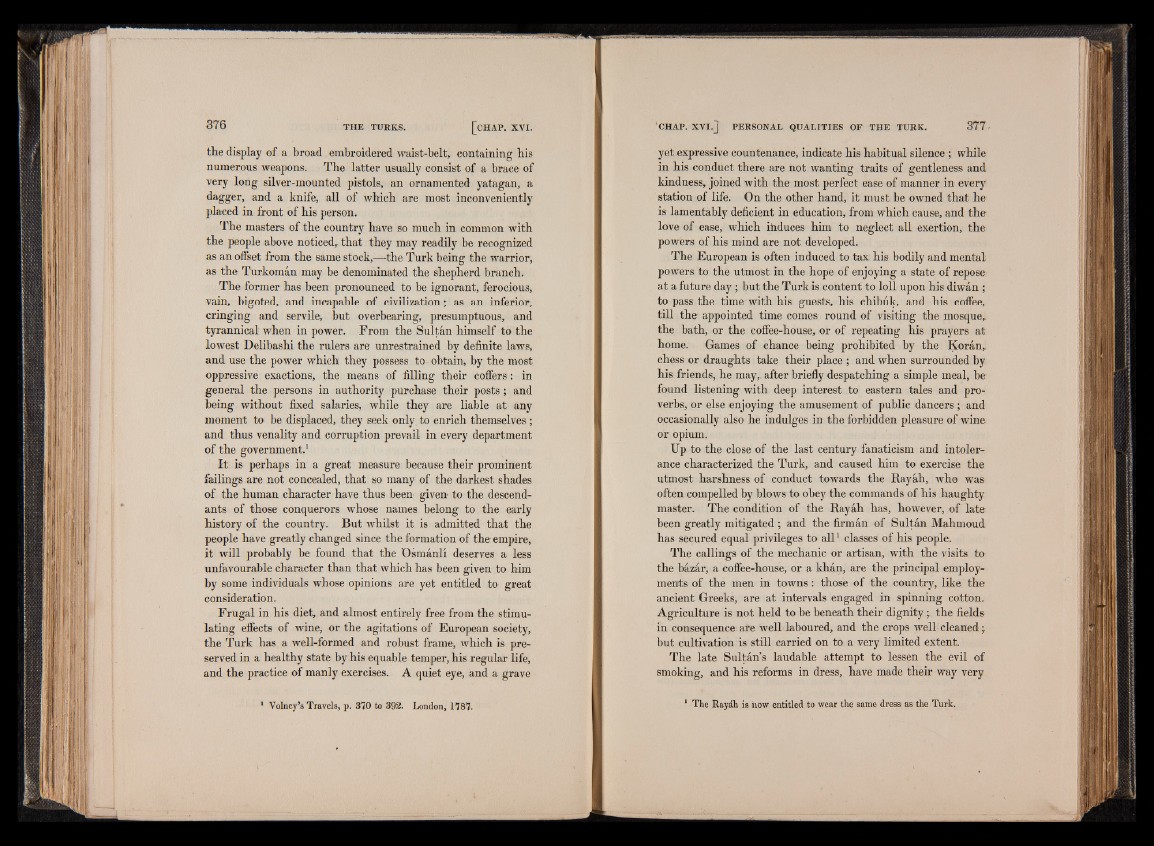
the display of a broad embroidered waist-belt, containing his
numerous weapons. The latter usually consist of a brace of
very long silver-mounted pistols, an ornamented yatagan, a
dagger, and a knife, all of which are most inconveniently
placed in front of his person.
The masters of the country have so much in common with
the people above noticed, that they may readily be recognized
as an offset from the same stock,—the Turk being the warrior,
as the Turkoman may be denominated the shepherd branch.
The former has been pronounced to be ignorant, ferocious,
vain, bigoted, and incapable of civilization; as an inferior,
cringing and servile, but overbearing, presumptuous, and
tyrannical when in power. From the Sultan himself to the
lowest Delibashi the rulers are unrestrained by definite laws,
and use the power which they possess to obtain, by the most
oppressive exactions, the means of filling their coffers : in
general the persons in authority purchase their posts; and
being without fixed salaries, while they are liable at any
moment to be displaced, they seek only to enrich themselves ;
and thus venality and corruption prevail in every department
of the government.1
It is perhaps in a great measure because their prominent
failings are not concealed, that so many of the darkest shades
of the human character have thus been given- to the descendants
of those conquerors whose names belong to the early
history of the country. But whilst it is admitted that the
people have greatly changed since the formation of the empire,
it will probably be found that the ’Osmanli deserves a less
unfavourable character than that which has been given to him
by some individuals whose opinions are yet entitled to great
consideration.
Frugal in his diet, and almost entirely free from the stimulating
effects of wine, or the agitations of European society,
the Turk has a well-formed and robust frame, which is preserved
in a healthy state by his equable temper, his regular life,
and the practice of manly exercises. A quiet eye, and a grave
1 Volney’s Travels, p. 370 to 392. London, 1787.
yet expressive countenance, indicate his habitual silence; while
in his conduct there are not wanting traits of gentleness and
kindness,, joined with the most perfect ease of manner in every
station of life. On the other hand, it must be owned that he
is lamentably deficient in education, from which cause, and the
love of ease, which ihduces him to neglect all exertion, the
powers of his mind are not developed.
The European is often induced to tax his bodily and mental
powers to the utmost in the hope of enjoying a state of repose
at a future day ; but the Turk is content to loll upon his diwán ;
to pass the time with his guests, his chibúk, and his coffee,
till the appointed time comes round of visiting the mosque,
the bath, or the coffee-house, or of repeating his prayers at
home. Games of chance being prohibited by the Koran,
chess or draughts take their place ; and when surrounded by
his friends, he may, after briefly despatching a simple meal, be
found listening with deep interest to eastern tales and proverbs,
or else enjoying the amusement of public dancers; and
occasionally also he indulges in the forbidden pleasure of wine
or opium.
Up to the close of the last century fanaticism and intolerance
characterized the Turk, and caused him to exercise the
utmost harshness of conduct towards the Rayáh, who was
often compelled by blows to obey the commands of his haughty
master. The condition of the Rayáh has, however, of late
been greatly mitigated ; and the firmán of Sultán Mahmoud
has secured equal privileges to all1 classes of his people.
The callings of the mechanic or artisan, with the visits to
the bázár, a coffee-house, or a khán, are the principal employments
of the men in towns: those of the country, like the
ancient Greeks, are at intervals engaged in spinning cotton.
Agriculture is not held to be beneath their dignity -r the fields
in consequence; are well laboured, and the crops well-cleaned
but cultivation is still carried on to a very limited extent.
The late Sultán’s laudable attempt to lessen the evil of
smoking, and his reforms in dress, have made their way very
1 The Raydh is how entitled to wear the same dress as the Turk.